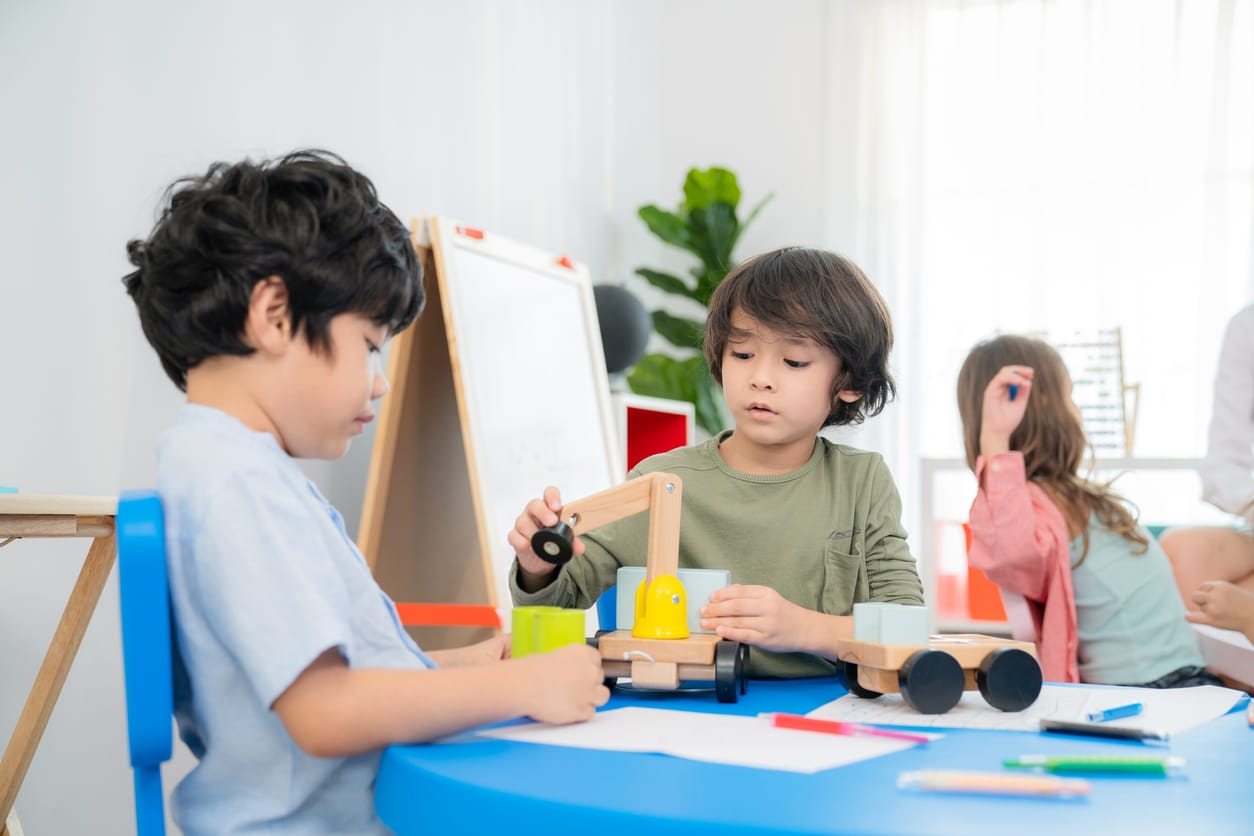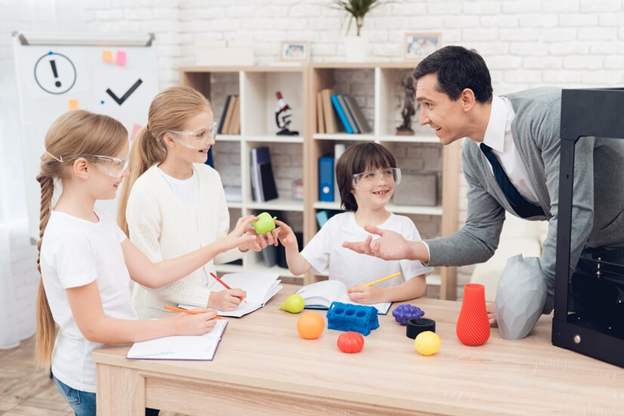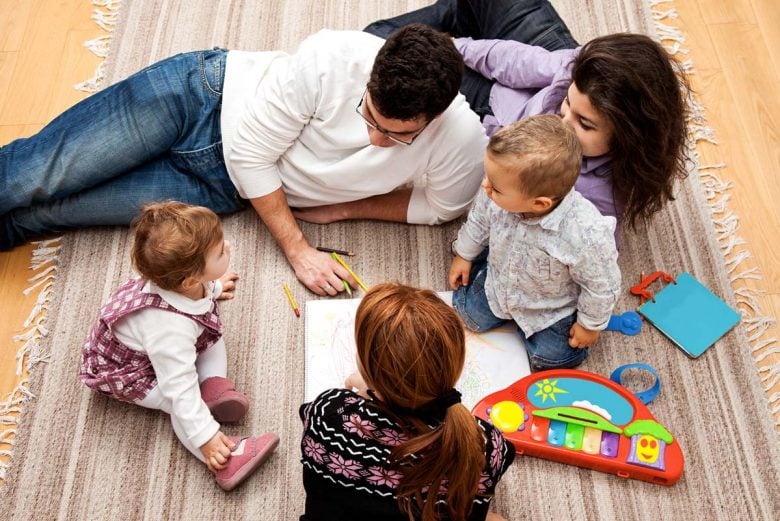Navigating well in social situations helps children develop into confident, kind individuals. Learning social skills for kids, like listening, sharing, and respecting each other’s differences, helps them form valuable friendships. More than that, they will become happier and feel more connected, key signs of a thriving child’s well-being. In this article, we discuss the importance of social skills and simple ways to teach them.
You will also discover how to encourage your child to use those positive behaviors to support the development of healthy relationships.
Why Social Skills Matter

The practice of basic social skills in children consists of more than just proper word choice. These skills help children:
- Solve problems without fighting
- Feel good about themselves
- Understand how others feel
- Make and keep friends
- Work well in groups
- Feel good about themselves
Children with strong social skills often do better in school. They also feel less stressed and more confident. These skills support emotional growth and lead to better behavior both at home and in school.
Core Social Skills Kids Need
Listening shows respect. Children must pay attention with both their sight, hearing and emotional depth. They understand information better and create a feeling of worth in others through their complete focus on speaking to them.
1. Listening
Listening shows respect. Kids need to listen with their eyes, ears, and hearts. When they give full attention to others, they learn better and make others feel valued.
Teach your child to:
- Look at the speaker
- Stay quiet while listening
- Show your interest through nodding or through direct questions.
2. Sharing
Through sharing, children master the ability to care about others. The skill promotes their understanding that other people possess requirements equal to theirs. The skill allows people to develop trust and friendships.
Help your child by:
- Sharing toys with siblings
- Taking turns during games
- Talking about how it feels when someone shares or doesn’t share
3. Taking Turns
Turn-taking teaches patience. Children gradually understand that initial position will not always be theirs but waiting patiently is acceptable.
Make it fun by:
- Using timers to switch toys or tasks
- Playing board games
- Praising your child when they wait their turn
4. Saying Kind Words
The use of kind language leads to developing strong interpersonal connections. Pedagogical instruction should teach children to use appropriate words such as “good job” alongside “please” and “I’m sorry.”
Encourage this by:
- Modeling respectful talk
- Practicing kind phrases at home
- Praising polite behavior
5. Understanding Emotions
The ability to understand how others feel is a strong personal skill when used in social gatherings. The understanding of how others feel leads children to show improved treatment of people.
Teach emotional awareness by:
- Reading books about emotions
- Naming feelings (“You look sad,” “That made you happy”)
- Talking about feelings during daily events
How To Teach Social Skills At Home
Parents and their caregivers play a vital role in developing social skills for kids. You don’t need a classroom. Children receive daily opportunities to learn and witness proper conduct in their day-to-day experiences. This also ties in closely with parenting time guidelines, which encourage consistent, meaningful interactions between parents and children.
1. Be A Role Model
Children learn by watching. Practice daily actions that demonstrate respect together with kindness and patient behaviors.
For example:
- Say thank you and excuse me
- Listen when your child talks
- When making an error you should express an apology.
2. Use Stories And Role Play
Through books along with stories children develop knowledge about social norms. Use dolls or puppets during roleplaying to demonstrate various everyday situations.
Try this:
- Familiarize children with sharing through doll-based demonstrations
- Actuate the steps related to meeting someone new as a friend.
- Children should read narratives featuring good relationships between characters and acts of kindness.
3. Give Praise And Feedback
Catch your child doing something right. Praise the behavior you want to see more often.
Say things like:
- “I like how you waited your turn.”
- “That was kind of you to help your friend.”
- “You did a great job listening.”
If your child struggles, guide them gently:
- “Next time, let’s try asking instead of grabbing.”
- “Can you think of a kinder way to say that?”
4. Practice Problem Solving
Kids need help learning how to handle tricky situations. Teach them to stop, think, and act.
Use simple steps:
- What is the problem?
- How do you feel?
- What can you do?
- What will happen next?
This helps children pause and think instead of reacting with anger or tears.
Building Social Skills Through Play
Image Source.
Play is the perfect time to build social skills for kids. Whether it’s playing pretend, building blocks, or kicking a ball, children learn many lessons during play.
Encourage your child to:
- Join group activities like sports or clubs
- Play with others regularly
- Use teamwork in games
While playing, guide them to:
- Share tools or toys
- Take turns
- Share tools or toys
- Solve small arguments with words
You can even join the fun and use the moment to teach skills like patience, fairness, and listening.
Helping Shy Or Anxious Kids
A number of children experience difficulty when interacting with other people. They may feel shy or nervous. That’s okay. Different children show differing rates of development for their social abilities.
To support your child:
- Practice social situations at home
- Start with one-on-one playdates
- Encourage eye contact and greetings
- Praise small steps (“You said hi! That’s great!”)
Never force a child to speak or join a group. Gently encourage and support them at their pace.
Social Skills And Positive Behavior
Good behavior comes from strong social skills. When children know how to express themselves, they feel less frustrated. This reduces tantrums and fights.
Kids learn to think before they act. They also learn to care about how their actions affect others.
What If My Child Struggles?
Every child learns differently. Some need more time and support. If your child struggles with social skills, don’t panic.
Here’s what you can do:
- Stay calm and patient
- Focus on one skill at a time
- Use clear and simple words
- Practice daily in small ways
- Ask teachers for feedback
If needed, speak to a child therapist or counselor. They can help with extra support, especially if your child feels very anxious or gets into frequent conflicts.
Activities To Boost Social Skills
Image Source.
Try these simple activities at home or in the classroom. They make learning social skills for kids fun and natural.
1. Emotion Charades
Act out different feelings, such as happiness, sadness, anger, or surprise, for your partner to guess. The two of you might want to keep a few of these guesses on record for future reference.
It helps children learn to decipher facial expressions and body language.
2. Compliment Circle
One nice thing is said by each individual about another individual. Kindness and confidence grow as a result.
This can be played during mealtime or at bedtime.
3. “What Would You Do?” Game
Pose the question to your child: ‘What would you do if…’ and accompany it with a variety of social scenarios.
Example:
If your toy were taken, what would you do?
What if your companion is feeling down?
Discuss different methods of being kind and respectful. Talking through these scenarios helps improve decision-making and strengthens social skills for kids.
4. Cooperative Games
Participate in close-cooperation games. Such as:
- Collaboratively assembling enigmas
- Constructing a fort
- Participating in board game activities.
Discuss what succeeded and what failed after every match.
Social Skills In School
Educators instruct students in social aptitudes as well. Children develop the ability to interact with others through group projects, circle time, and the rules of the classroom. They learn to act in a collective setting.
Maintain communication with your child’s teacher. Inquire:
- What is my child’s behavior like with other people?
- Which social strengths do you observe?
- Are there places that need improvement?
Collaborate to bolster your child’s social development in both the home and school environments.
Final Thoughts
Social skills learned now will lead to better futures for kids. They will say nice things; they will make good choices; and they will have friends for a long, long time.
Power is in your hands as a parent or teacher. With you holding their support in the mix, kids can blossom into kind and confident and respectful individuals. Looking For More Parenting Support During Life Transitions? Visit SmartDivorceNetwork.com for expert advice, resources, and community stories to help your child grow socially and emotionally. You can also follow us on Facebook to receive the latest updates.

Smart Divorce Network is a blogger-based community that gives divorce professionals a unique platform to share insights and knowledge. Smart Divorce Network is the leading destination for smart divorce discussions between peers. You can share your thought and/or your articles here.







